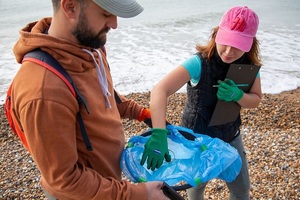Mushroom supplier to pay charity £54,880.33 for ignoring packaging regulations
The Environment Agency has accepted an Enforcement Undertaking from a Worcestershire-based fresh mushroom supplier who broke packaging regulations.

The Enforcement Undertaking is being used to help inspire ocean friendly behaviours
- Environment Agency estimates company handled nearly 9,000 tonnes of packaging
- Payment will help create new education materials for the charity
- Enforcement undertakings (EUs) used to address breaches of environmental legislation
Walsh Mushrooms Group of Vale Park, Evesham, is now working within the rules and has made a payment of £54,880.33 to the Marine Conservation Society to make amends for the failures.
The company, whose head office is in Gorey, Co Wexford in the Republic of Ireland, admitted they had not registered under packaging regulations between 2007-2017 and had failed to implement proper recycling practices.
Officers from the Environment Agency estimated that the company handled nearly 9,000 tonnes of packaging in that period.
The legislation is designed to ensure companies take a responsible approach to packaging materials.
Beth Haste, a regulatory officer for the Environment Agency, said:
Enforcement Undertakings are an effective enforcement tool used by the Environment Agency to enable businesses to address breaches of environmental legislation and contribute to environmental projects.
We are increasingly using this method of enforcement for suitable cases to bring businesses into compliance with environmental legislation and requirements, and to protect the environment. However, we will prosecute or impose monetary penalties in appropriate cases.
Please report any environmental issues to the Environment Agency’s 24 hour incident hotline on 0800 80 70 60.
Jenny Griffiths, Education Manager for the Marine Conservation Society, said:
The enforcement undertaking from Walsh Mushrooms is being used to research, design and create new education materials to inspire action and ocean friendly behaviours from consumers and businesses throughout England.
Notes to editor
What is an enforcement undertaking?
An EU is available to the Environment Agency as an alternative sanction to prosecution or monetary penalty for dealing with certain environmental offences. It is a legally-binding voluntary agreement proposed by a business (or an individual) when the Environment Agency has reasonable grounds to suspect that an environmental offence has occurred.
EUs for environmental offences were introduced under the Environmental Civil Sanctions (England) Order 2010 and the Environmental Civil Sanctions (Miscellaneous Amendments) (England) Regulations 2010.
Why use enforcement undertakings?
- businesses will voluntarily secure compliance now and in the future, without attracting a criminal record
- the environment, local community and those directly impacted by the offending can benefit through actions being offered in an EU
- they allow us to deal with the less intentional and polluting offending in a more proportionate way than prosecution through the criminal courts
- EUs go beyond the bare minimum needed for a business to comply, as shown in the list of accepted EUs we publish on GOV.UK
How can businesses benefit from enforcement undertakings instead of prosecution?
Accepting an EU is always at the discretion of the Environment Agency but if accepted replaces the need for an alternative sanction, such as prosecution or monetary penalty.
The Environment Agency has produced guidance and standard forms to help those wishing to make offers. However, we expect responsible businesses to co-operate with the Environment Agency and seek our advice at an early stage, as we are more likely to accept EUs which have been offered early or proactively.
When offering an EU, businesses must accept responsibility for the offending and include actions which will stop offending, ensure future compliance, protect any harm/damage as well as making a financial contribution towards a suitable environmental project which helps protect, improve or protect the natural capital of England.
The regulation/s the company did not meet
Between 2007-2017: Regulation 40 (1) a failure to register under the Producer of Responsibility Obligations (Packaging Waste) Regulations 2007.
Between 2007-2017: Regulation 40 (1) b failure to recover/recycle the Producer of Responsibility Obligations (Packaging Waste) Regulations 2007.